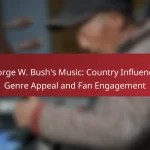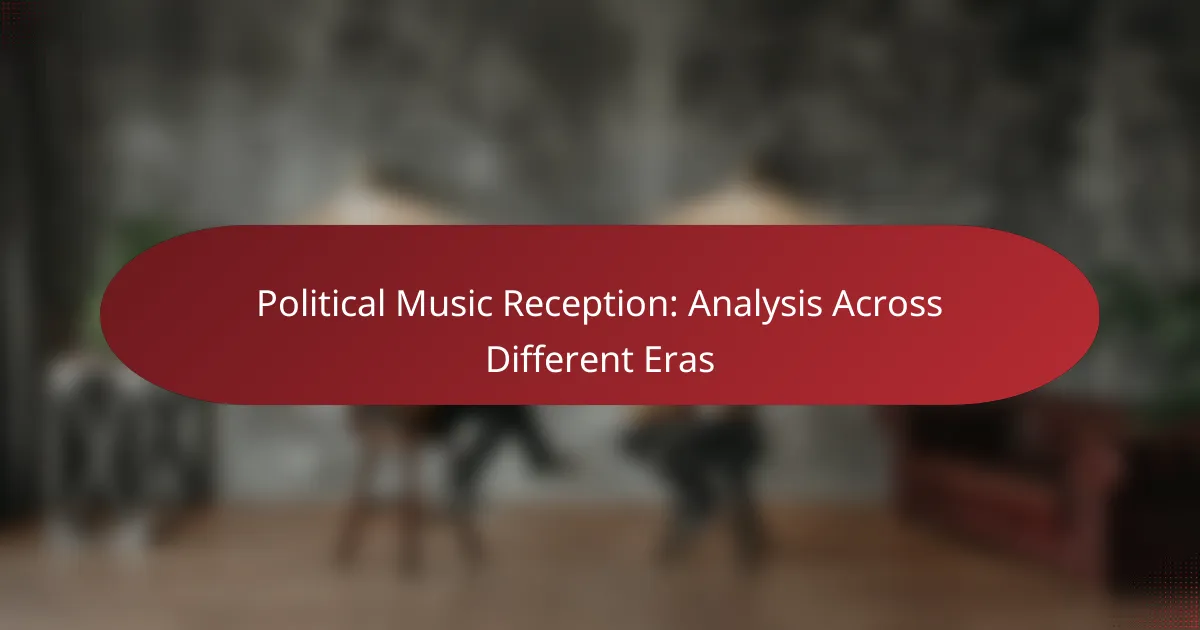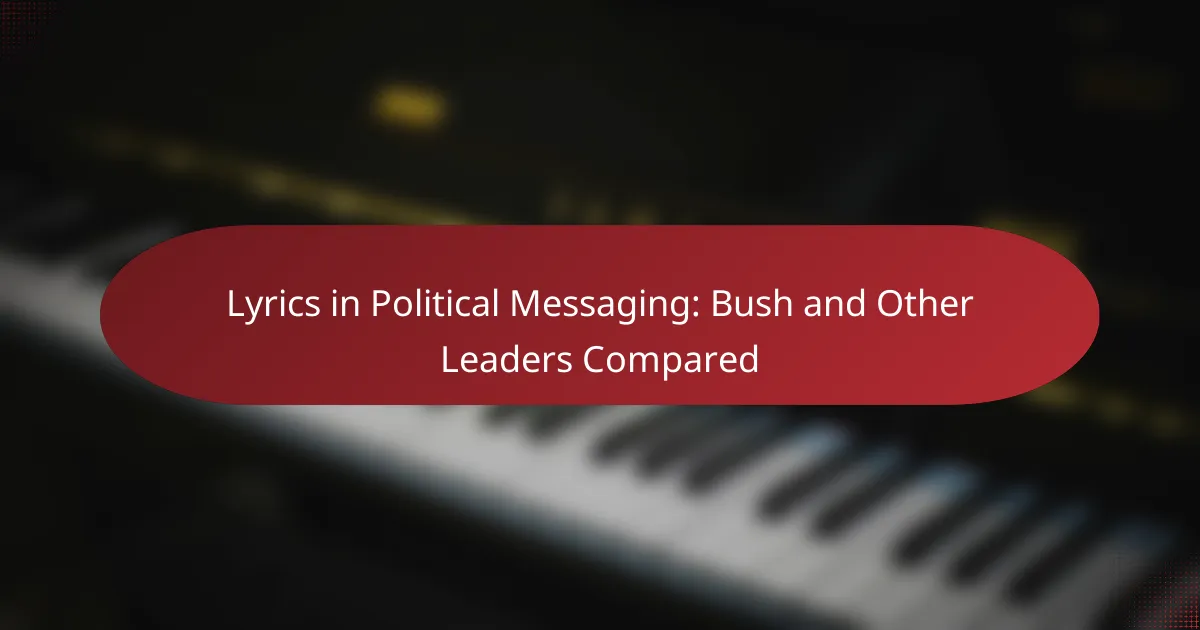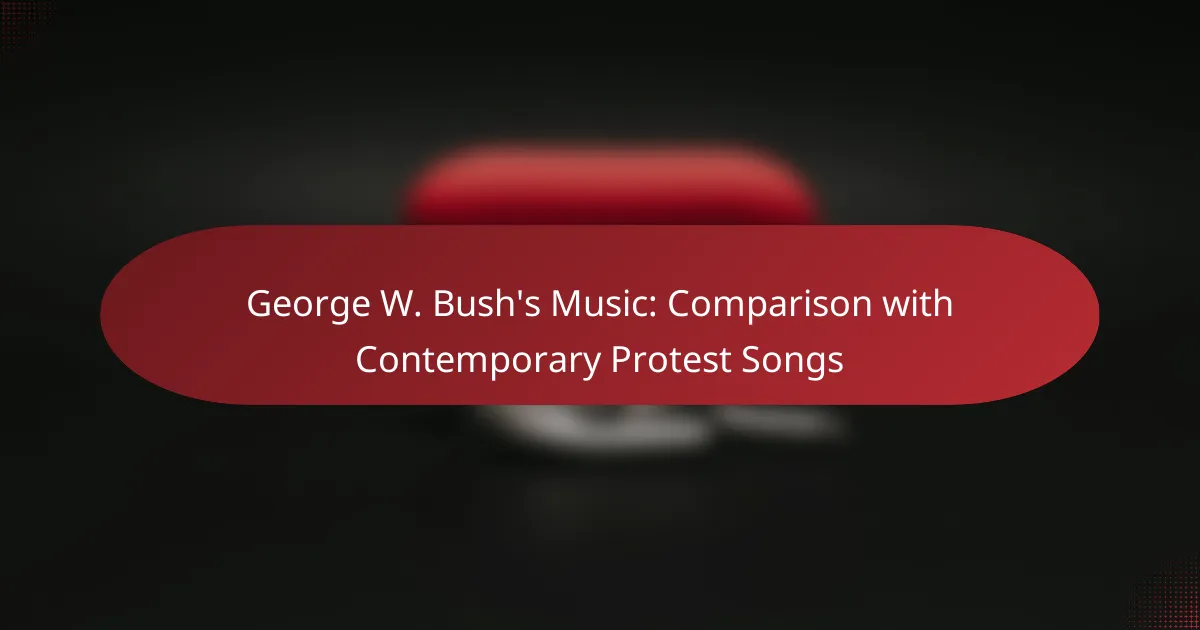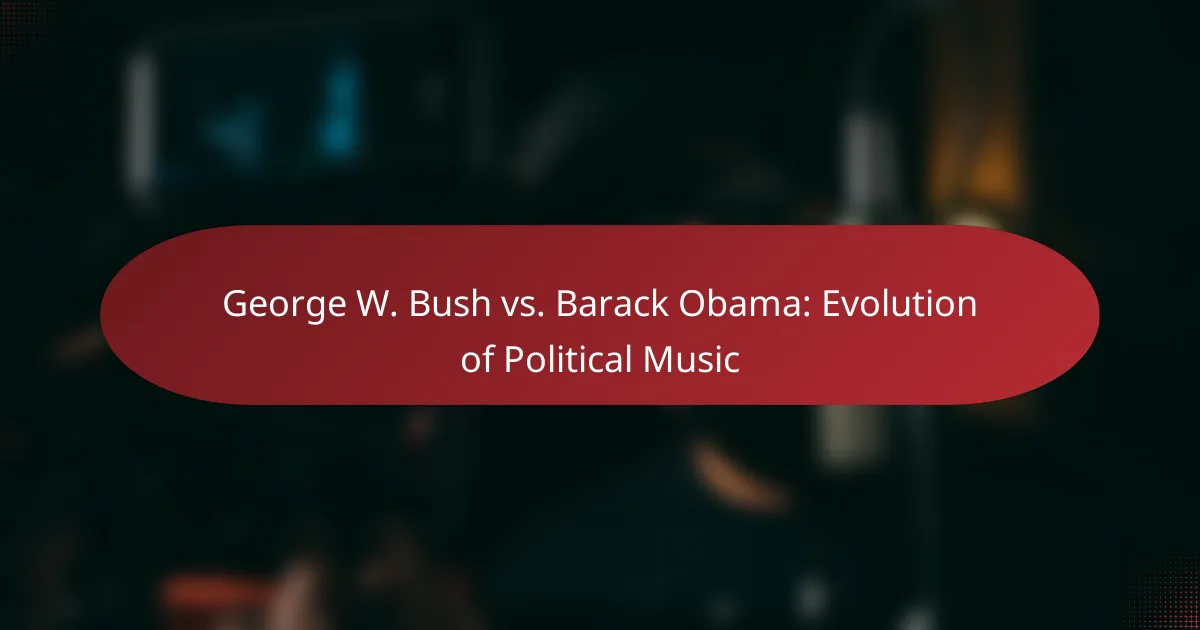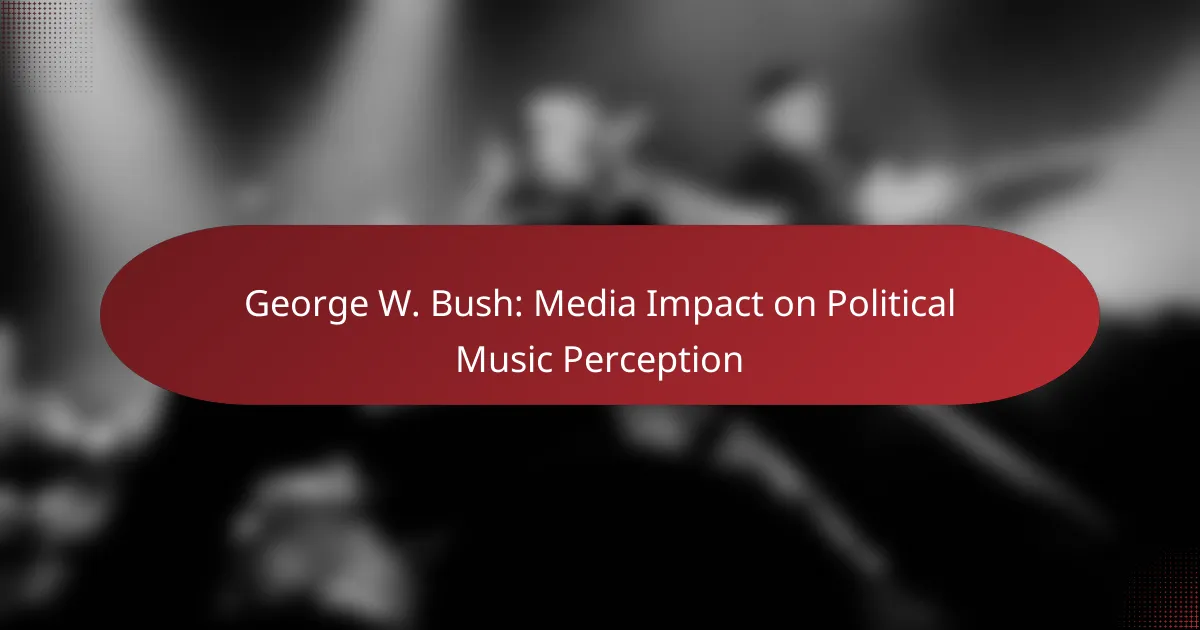Political music has historically served as a catalyst for social change, resonating with audiences and galvanizing movements across various eras. By reflecting societal issues and inspiring collective action, it remains a vital form of expression that evolves with the political landscape. Today, the reception of political music is shaped by digital platforms, allowing for immediate engagement and broader dissemination of its messages.
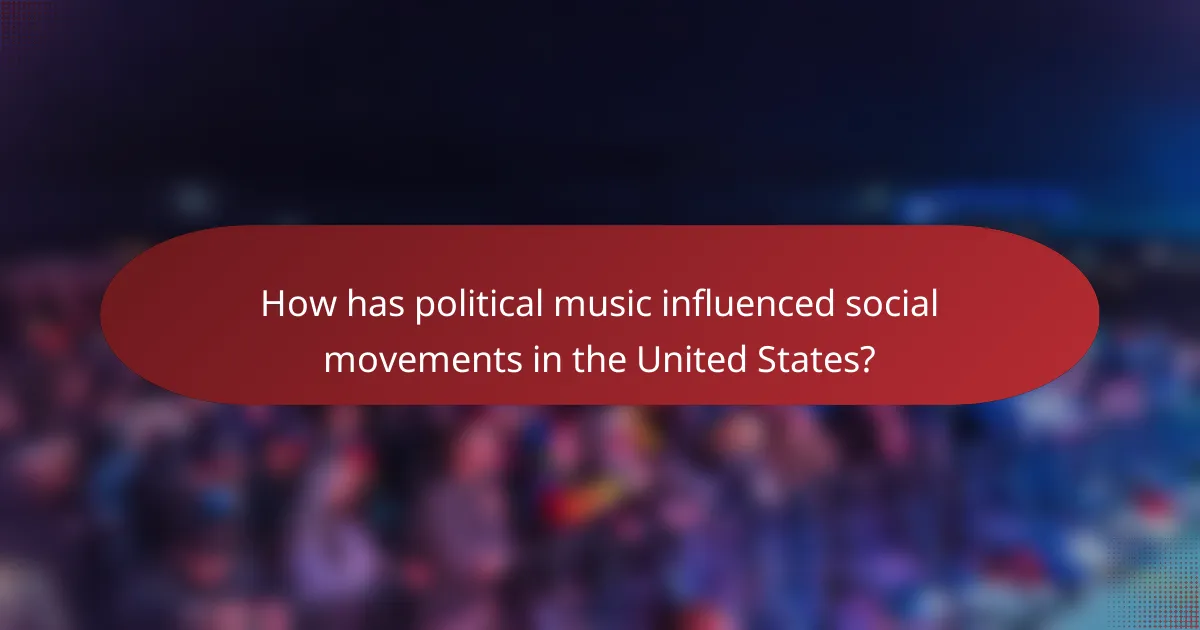
How has political music influenced social movements in the United States?
Political music has played a significant role in shaping social movements in the United States by amplifying messages, mobilizing supporters, and fostering a sense of community. Through various genres, artists have addressed social injustices and inspired collective action, making music a powerful tool for activism.
Impact of protest songs in the 1960s
Protest songs in the 1960s became anthems for the civil rights and anti-war movements, effectively communicating the sentiments of a generation. Artists like Joan Baez and Bob Dylan used their music to challenge societal norms and advocate for change, often performing at rallies and demonstrations.
These songs not only provided a soundtrack for activism but also helped to unify diverse groups around common goals. The emotional resonance of these tracks encouraged listeners to engage in activism, making them integral to the movements of the time.
Role of hip-hop in contemporary activism
In recent years, hip-hop has emerged as a critical voice in contemporary activism, addressing issues such as racial inequality, police brutality, and economic injustice. Artists like Kendrick Lamar and J. Cole use their platforms to raise awareness and inspire action, often reflecting the struggles faced by marginalized communities.
The genre’s ability to reach a younger audience has made it particularly effective in mobilizing support for social causes. Through powerful lyrics and engaging beats, hip-hop artists have transformed personal narratives into broader calls for social change.
Case studies of key artists like Bob Dylan and Public Enemy
Bob Dylan’s music, particularly songs like “The Times They Are a-Changin’,” encapsulated the spirit of the 1960s, urging listeners to embrace change and challenge the status quo. His influence extended beyond music, as he became a symbol of the era’s social upheaval.
Conversely, Public Enemy brought political consciousness to hip-hop in the late 1980s and early 1990s, using their music to address systemic racism and social injustice. Their album “It Takes a Nation of Millions to Hold Us Back” is a landmark work that combines sharp lyrics with a strong political message, demonstrating how hip-hop can serve as a catalyst for social movements.
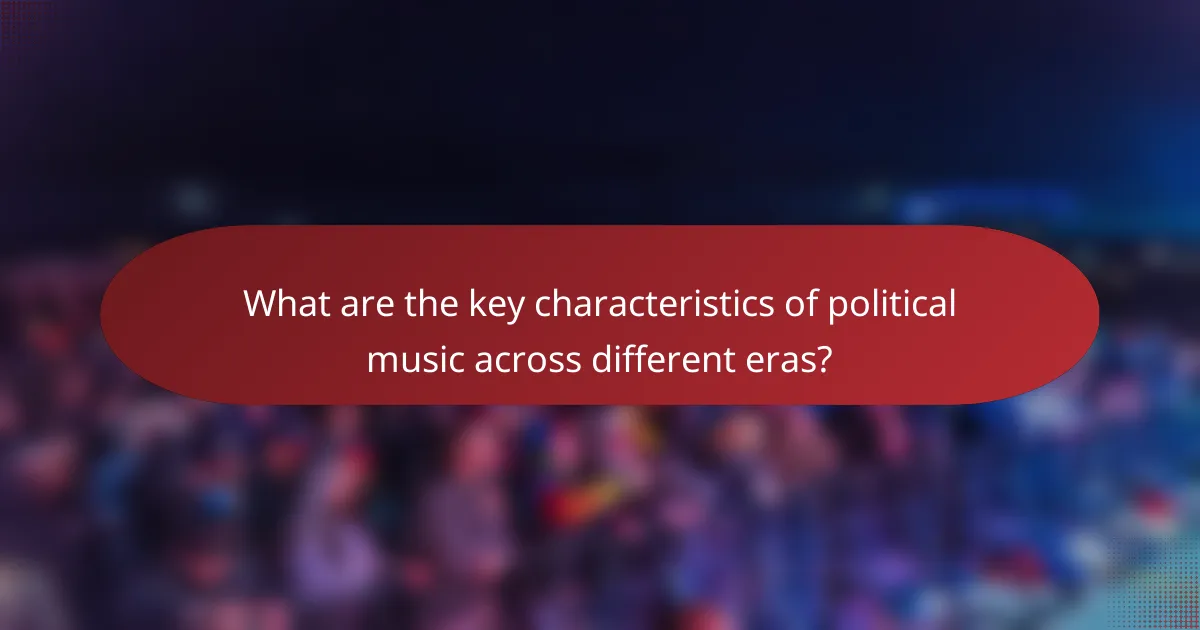
What are the key characteristics of political music across different eras?
Political music is characterized by its ability to reflect societal issues, provoke thought, and inspire action. Across different eras, it has evolved in style and substance, often mirroring the political climate and cultural movements of the time.
Defining features of 1960s protest music
The 1960s protest music emerged as a powerful voice against war, civil rights injustices, and social inequality. Artists like Bob Dylan and Joan Baez used folk and rock genres to convey messages of peace and activism, often incorporating simple melodies that made their songs accessible to a broad audience.
Key characteristics included direct lyrics that addressed political issues, a strong sense of community among listeners, and a focus on grassroots movements. Songs like “Blowin’ in the Wind” became anthems for change, emphasizing the urgency of social reform.
Evolution of political themes in 1980s rock
The 1980s saw a shift in political themes within rock music, influenced by the Cold War and rising global tensions. Bands like U2 and The Clash began to incorporate more complex narratives, addressing issues such as human rights, economic disparity, and anti-establishment sentiments.
Musically, the era blended rock with new wave and punk, creating a diverse sound that appealed to younger audiences. Songs like “Sunday Bloody Sunday” highlighted specific events, urging listeners to engage with political realities while maintaining a sense of urgency and rebellion.
Modern political commentary in pop music
In contemporary pop music, political commentary is often woven into mainstream hits, reflecting current social issues such as climate change, racial equality, and gender rights. Artists like Beyoncé and Kendrick Lamar use their platforms to address these topics, blending catchy hooks with thought-provoking lyrics.
The accessibility of digital platforms allows for rapid dissemination of political messages, making it easier for artists to reach a global audience. However, the challenge lies in balancing commercial success with genuine activism, as some critics argue that political themes can be diluted in pursuit of mainstream appeal.
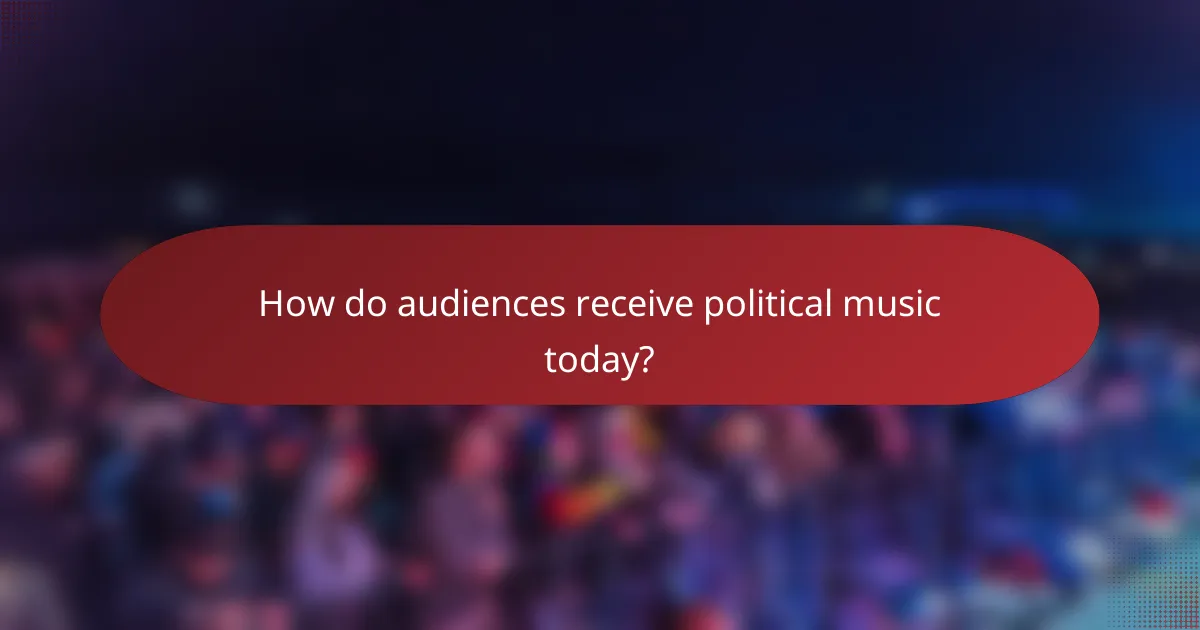
How do audiences receive political music today?
Audiences today receive political music through a combination of streaming platforms and social media, which shape their engagement and interpretation. The accessibility of music online allows for immediate reactions and discussions, influencing how political messages are perceived and shared.
Engagement metrics on streaming platforms
Streaming platforms provide valuable engagement metrics that reflect how audiences interact with political music. Metrics such as plays, shares, and playlist additions can indicate the popularity and resonance of a song’s political message. For example, songs that achieve high play counts often correlate with significant social movements or events.
Artists can utilize these metrics to tailor their marketing strategies, focusing on songs that generate the most engagement. Monitoring trends in listener demographics can also help in understanding which messages resonate with specific audiences.
Influence of social media on music reception
Social media plays a crucial role in shaping the reception of political music by facilitating discussions and amplifying messages. Platforms like Twitter and Instagram allow artists to share their political views directly with fans, creating a more personal connection. This direct engagement can enhance the impact of their music.
Moreover, social media enables rapid dissemination of political music, often leading to viral moments that can significantly boost a song’s visibility. However, artists should be mindful of potential backlash or misinterpretation of their messages, which can occur in the fast-paced online environment.
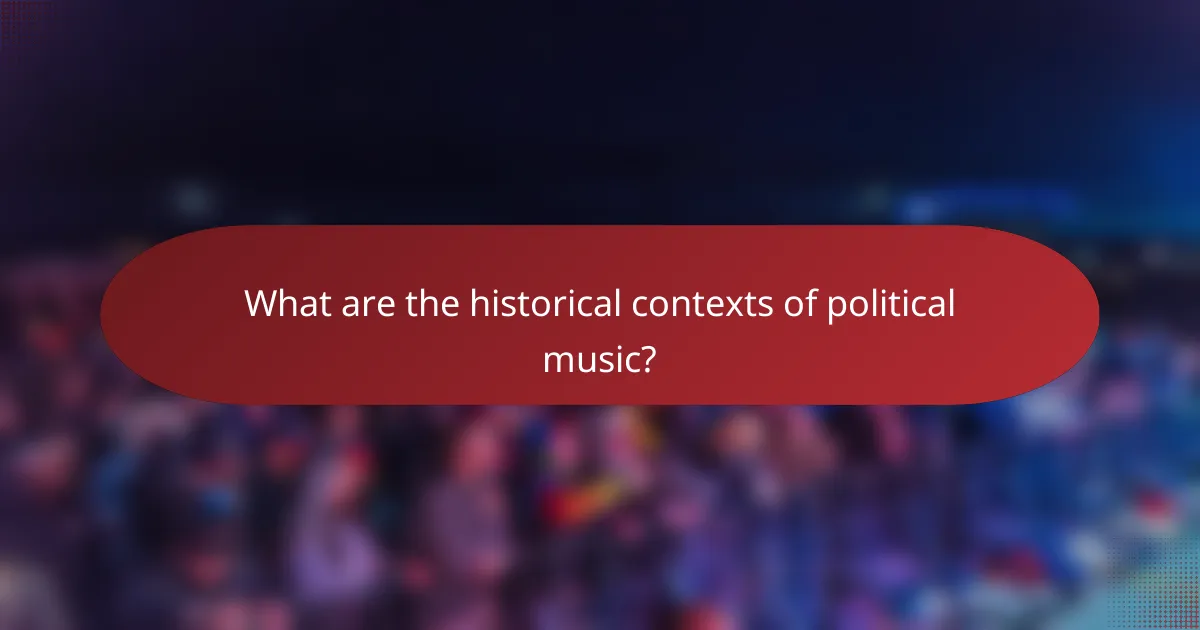
What are the historical contexts of political music?
Political music has evolved significantly across different eras, often reflecting the social and political climates of the times. It serves as a powerful medium for protest, expression, and mobilization, shaping public opinion and influencing movements.
Political music during the Vietnam War
During the Vietnam War, political music became a vital tool for anti-war sentiment, with artists using their platforms to voice opposition to U.S. involvement. Songs like “Fortunate Son” by Creedence Clearwater Revival and “Give Peace a Chance” by John Lennon resonated with a generation disillusioned by the conflict.
This era saw a surge in folk and rock music that emphasized themes of peace, freedom, and social justice. The music not only provided a soundtrack for protests but also fostered a sense of community among activists, helping to galvanize the anti-war movement.
Music’s role in the Civil Rights Movement
In the Civil Rights Movement, music played a crucial role in unifying activists and spreading messages of equality and justice. Songs like “We Shall Overcome” became anthems for the movement, symbolizing hope and resilience in the face of adversity.
Artists such as Nina Simone and Sam Cooke used their music to highlight the struggles faced by African Americans, addressing issues like segregation and discrimination. The emotional power of these songs helped to inspire action and solidarity, making music an integral part of the fight for civil rights.
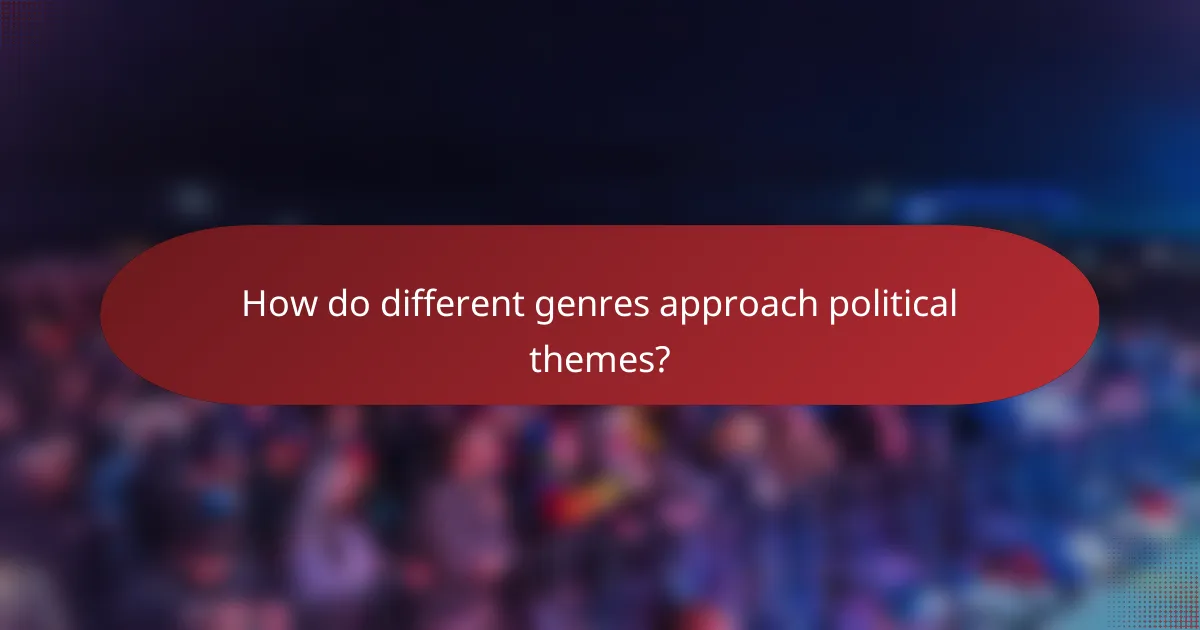
How do different genres approach political themes?
Different music genres tackle political themes in unique ways, reflecting their cultural roots and audience engagement. Folk music often tells stories that resonate with social issues, while rap delivers pointed critiques of societal injustices, and rock embodies a spirit of rebellion against authority.
Folk music’s narrative style
Folk music uses storytelling to convey political messages, often drawing from historical events and personal experiences. This genre emphasizes lyrical content that highlights social struggles, making it relatable and impactful for listeners.
Artists like Bob Dylan and Joan Baez exemplify this approach, using their songs to address civil rights and anti-war sentiments. The narrative style allows for deep emotional connections, encouraging audiences to reflect on the issues presented.
Rap’s direct messaging
Rap music is characterized by its straightforward and often confrontational approach to political themes. The genre’s rhythmic delivery and lyrical complexity allow artists to express their views on systemic issues like racism, poverty, and police brutality.
Notable figures such as Kendrick Lamar and Public Enemy have used their platforms to challenge societal norms and provoke thought. The immediacy of rap’s messaging resonates particularly with younger audiences, making it a powerful tool for social commentary.
Rock’s rebellious spirit
Rock music embodies a rebellious attitude, often opposing established norms and authority. This genre frequently addresses political themes through anthems that inspire action and resistance, appealing to a sense of freedom and individuality.
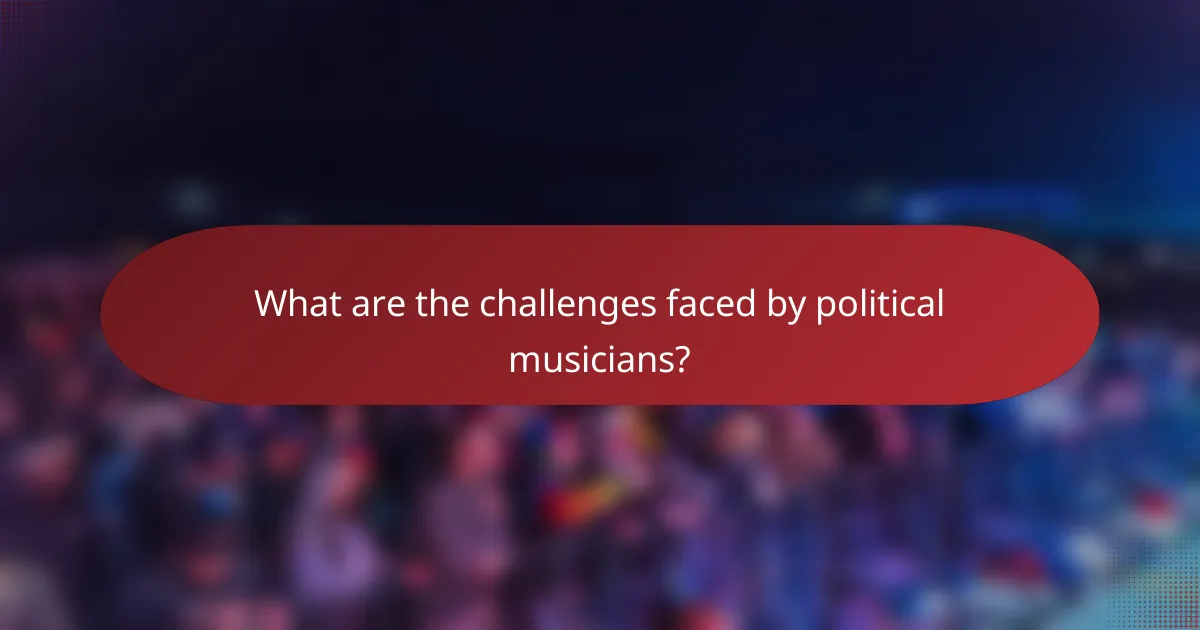
What are the challenges faced by political musicians?
Political musicians encounter various challenges that can hinder their ability to express their views freely and effectively. These challenges include censorship, commercial pressures, and the need to balance artistic integrity with audience expectations.
Censorship and artistic freedom
Censorship poses a significant challenge for political musicians, as governments or organizations may restrict their ability to express dissenting opinions. In many countries, artists face the risk of having their work banned or facing legal repercussions for controversial content.
To navigate censorship, musicians often have to be strategic about their messaging. Some may choose to use metaphorical language or indirect references to convey their political stance without attracting unwanted attention. This approach can dilute the impact of their message but may allow them to reach a wider audience.
Commercial pressures in the music industry
Commercial pressures can also limit the effectiveness of political musicians. Record labels and producers often prioritize marketability over artistic expression, pushing artists to conform to mainstream trends rather than promoting their political messages. This can lead to a compromise in the authenticity of their work.
Musicians can mitigate these pressures by seeking independent distribution channels or engaging directly with their audience through social media platforms. By building a loyal fan base that values their political stance, artists can maintain their integrity while still achieving commercial success.
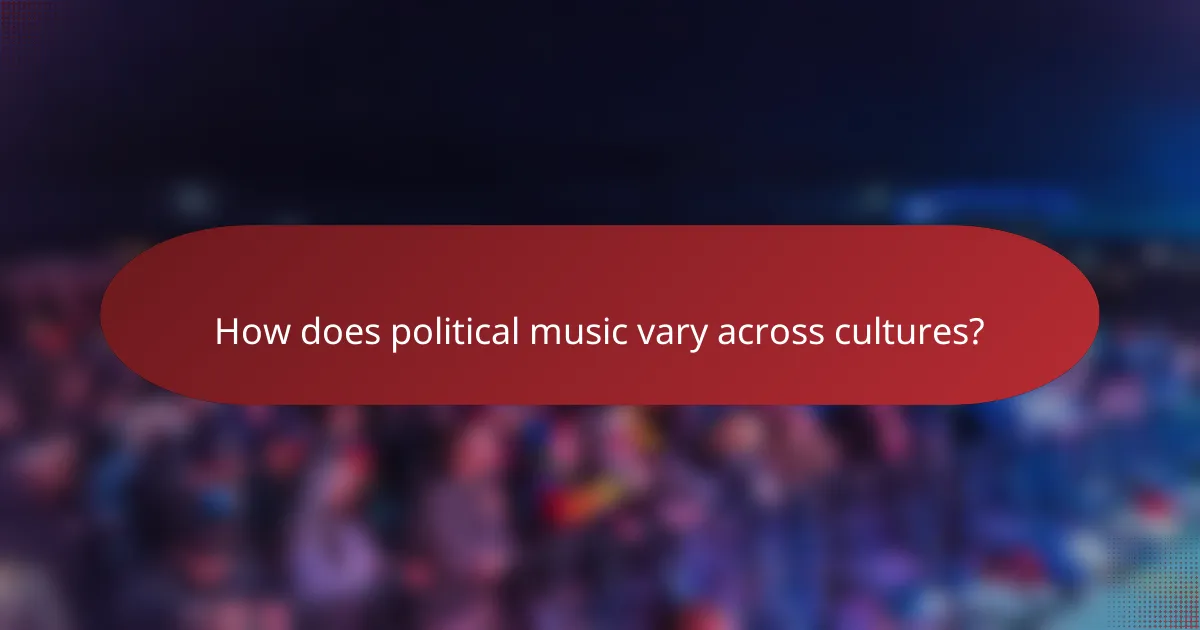
How does political music vary across cultures?
Political music reflects the values, struggles, and social issues of different cultures, often serving as a voice for the marginalized. Variations arise from historical contexts, musical styles, and the political landscape of each region.
Comparative analysis of political music in Europe
In Europe, political music has evolved through various historical movements, from folk songs that protested against oppression to contemporary genres like punk and hip-hop that address modern issues. Countries like the UK and France have rich traditions of politically charged music, often intertwining with national identity and social movements.
For example, British punk bands in the late 1970s, such as The Clash, used their music to critique government policies and social injustices. In contrast, French chanson artists like Georges Brassens and later, artists like Saïan Supa Crew, have blended poetic lyrics with social commentary, reflecting the unique cultural landscape of France.
When analyzing political music in Europe, consider the impact of local events, such as the fall of the Berlin Wall or the rise of the European Union, which have inspired a diverse range of musical expressions. Understanding these cultural nuances can enhance appreciation for how political music resonates within each society.



